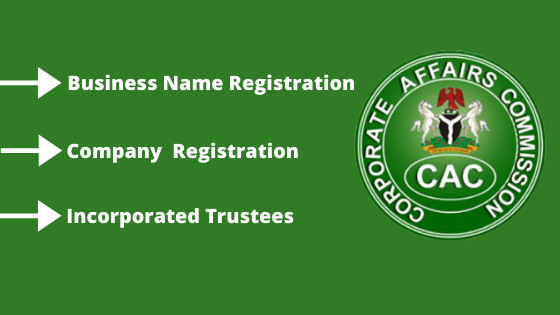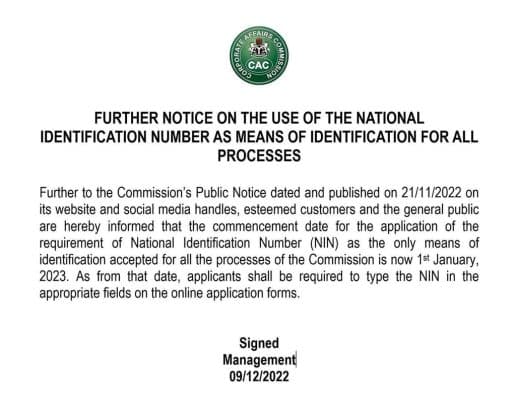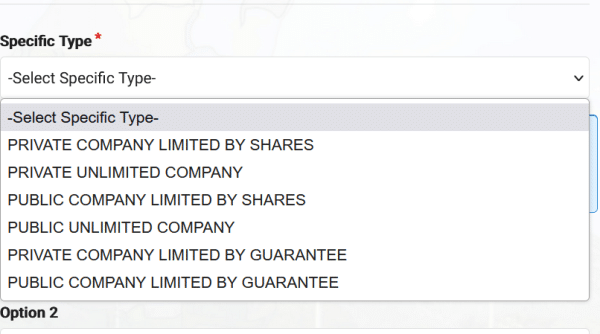With the Inception of the NIN policy in January of 2023 as one of the mandatory requirements for registering a business name with CAC in Nigeria, many business owners have been left at six and seven.
Sequel before the inception of this policy, business owners could register and operate a business in Nigeria with just a birth certificate proving their nationality.
As it stands, you can not legally register and own a business in Nigeria if you don’t have the National Identification Number (NIN) which is being issued by the NIMC
But what about the other requirements to incorporate a business in Nigeria? this guide will keep you on the hook.
Types of Business Registration in Nigeria
The Corporate Affairs Commision is the Federal Government Agency saddled with the responsibility of regulating the formation and operation of businesses in Nigeria.
Below are the types of Business of businesses by category that can be registered under the commision.
1. Business Name
Business Name is done for small enterprises (SMEs). The ownership of a business name is usually a sole proprietorship
2. Company
A Limited liability company is a legal entity formed by a group of individuals to engage in and operate a business commercial or industrial enterprise
As compared to Business names, companies are for larger business operations. If you are finding it hard to choose between registering a Business name or a company, you should look out why Company is better than a Business name
- Read Also: SCUML Online Registration
2. Incorporated Trustee
The Incorporated Trustees are non-business and non-profit making organizations formed to facilitate the acquisition of corporate personality by a community of persons bound together by custom, religion, nationality or any association of persons established for religious, educational, literary, scientific, or social developments.
Incorporated Trustee includes NGOs, Churches, Foundations and Associations
Requirements For Registering A Business Name in Nigeria 2023
If you are a long-time business owner, or even if you are just getting into the business. Getting legal documentation could be very beneficial for your business.
Here are some snippets of things you need.
1. Business Details
The Corporate Affairs Commision will ask you to provide credible information about your business. This includes
✅ 2 Propose Business Names
✅ Business Email (If any)
✅ Business Phone Number
✅ Valid Business Address (This includes State, LGA city or village, house number and street)
CAC doesn’t joke with house numbers. Make sure your address is well-descriptive and traceable enough
✅ Nature of Business (This is what your business is all about)
Some businesses can’t be registered under BUSINESS NAME, they include schools, import and export, cryptocurrency etc.
2. Proprietor Details
Business Names are the sole proprietorship in Nature. As a One Man-Business owner, below are checklists needed from you for CAC
✅ National Identification Number (NIN). Your NIN must be validated
✅ Proprietor Name (Name automatically shows up from your NIN database)
✅ Phone Number
✅ Occupation
✅ Service Address (This is also referred to as a Business address in most cases)
✅ Residential Address (This must capture State, LGA, City or Village, House No. and street name)
List of Documents to Upload for CAC Business Name Registration
With the CAC NIN policy, some documents are no longer needed for upload. Once you input your NIN, CAC automatically captures your information in your NIN database such as your signature.
However, you need to upload your Physical NIN card (in PDF) to complete your registration
Types of Company Registration in Nigeria
There are so many broad and are registered according to the activities they carry out. Below are the types of company registrations with CAC
1. Private Limited Liability Company
2. Private Unlimited Company
3. Public Company Limited By Shares
4. Public Unlimited Shares
5. Private Company Limited By Guarantee
6. Public Company Limited by Guarantee
CAC Requirements For Company Registration in Nigeria
With company registration being most preferred over the business name, below are some checklists to register and own a company with CAC
1. Company Details
✅ 2 Propose Company Names
✅ The Company Email Address
✅ Company Phone Number
✅ Valid Company Address (This includes State, LGA city or village, house number and street)
CAC doesn’t joke with house numbers. Make sure your address is well-descriptive and traceable
✅ Nature of Company (This is what your company is all about). A company can accommodate up to 10 business activities under its name.
✅ The Total Company Share Capital (Shares vary for different companies)
✅ Shares Distribution
2. Directors’ Details
Note: 1 person can register and own a company. In a situation where there are 2 or more directors, they must provide the following details
✅ National Identification Number (NIN). NIN must be validated
✅ Director Name (Name is adopted from NIN database)
✅ DOB (Will be automatically adopted from the NIN database and you can’t change it)
✅ Phone Number
✅ Occupation
✅ Service Address (This is also referred to as a Company address)
✅ Residential Address (This must capture State, LGA, City or Village, House No. and street name)
3. Shareholders
A shareholder is a person, company, or institution that owns at least one share of a company’s stock or in a mutual fund.
Shareholders must provide the necessary details as seen above.
4. Witness
A corporate witness is often an employee of the corporation with specialized access to the records of the corporation, and with enhanced knowledge of their procedures
Relevant bio details are also required from the witness for CAC registration
5. Secretary
For small companies, the services of a secretary are optional and not needed.
Documents to Upload for CAC Company Registration
With the NIN policy, you only have to upload your physical national Identity card (in a PDF file) of the directors, shareholders, witnesses and secretaries as the case might be on the CAC website.
Requirements for Incorporated Trustees
To register an Incorporated Trustee such as NGO in Nigeria, below are some checklists
1. NGO/Church/Association/Foundation Details
✅ 3 Propose Names
✅ Description and Mission
✅ Aims and Objectives (Could be 5)
✅ Official Email
✅ Registered Office Address (State; City or Village, House No. Street name)
✅ Minimum Number of Trustees
✅ Maximum Number of Trustees
✅ Trustees Tenure
2. Trustees Information
Incorporated Trustee demands a minimum number of 3 Trustees. They must provide the following
- Name
- Address
- Occupation
- DOB
- Phone Number
3. Portfolio
This could be a Chairman, Secretary, Treasurer, or even Members
Who Should Register My Business Name, Company or Trustee?
Legacy Benjamin Consult is one of the most trusted CAC consulting agencies in Nigeria. The brand offers all kinds of CAC Registrations.
Our services are:
- Business Name Registration
- Company Registration
- Trustee Registration
- Upgrade From BN to RC
- Post Incorporations
- SCUML
- Export Licence
- Trademark
Send us a DM now on WhatsApp at 08066108299 for a speedy and seamless CAC registration.
How Will I Get My Documents?
Since the inception of the New CAC portal and CPR. All CAC documents (ORIGINAL) are sent electronically to your email and on WhatsApp.
We can also print, frame and send to you at extra cost.
Read Also:
Is Annual Returns Compulsory?
Conclusion: Requirements For Registering A Business Name in Nigeria
Conclusively, getting your brand registered with CAC is one way to keep your business on the growth trajectory. I hope this guide has provided you with the basic requirements for registering a business name, company and NGO in Nigeria.
Leave a comment below if you found this piece of writing insightful

Legacy Benjamin is a serial SEO content writer with a half-decade of experience in the field of blogging. He is also a skilled business consultant, providing valuable insights to companies and individuals seeking growth and success. His expertise lies in crafting compelling and engaging content that captivates audiences and drives business results. For business deals, contact him




